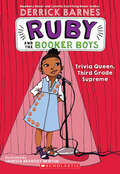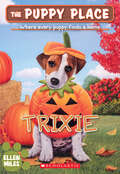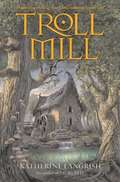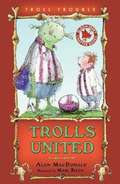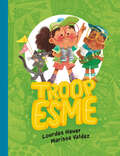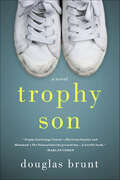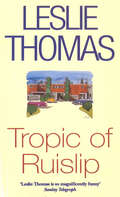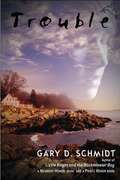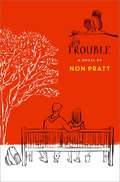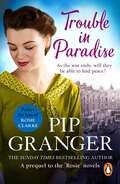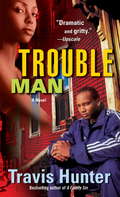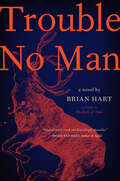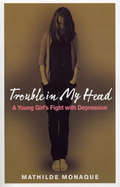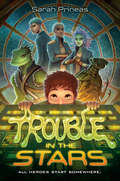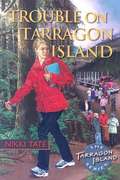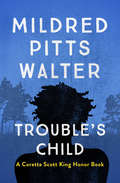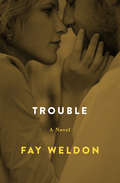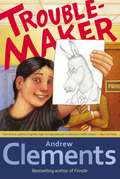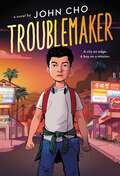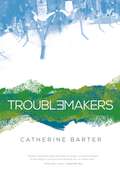- Table View
- List View
Trivia Queen, Third Grade Supreme (Ruby and the Booker Boys #2)
by Derrick D. BarnesEight-year-old ultra-fabulous Ruby Marigold Booker returns in this reissue of the Ruby and the Booker Boys series by Newbery Honor and Coretta Scott King Honor author Derrick Barnes!Brought to you by Newbery Honor author Derrick Barnes, eight-year-old Ruby Booker is the baby sis of Marcellus (11), Roosevelt (10), and Tyner (9), the most popular boys on Chill Brook Ave. When Ruby isn't hanging with her friend, Theresa Petticoat, she's finding out what kind of mischief her brothers are getting into. She's sweet and sassy and every bit as tough as her older siblings. And now, bring on the spotlight! Ruby Booker is ready to shine! Her chance is coming up: There's an animal trivia contest at her school, and the winner gets season passes to the Chill Brook Zoo for everyone in his or her grade! The problem is, she needs a little help...
Trixie (The Puppy Place)
by Ellen MilesWelcome to the Puppy Place! Where every puppy finds a home. Charles and Lizzie Peterson love puppies. Their family fosters these young dogs, giving them love and proper care, until they can find the perfect forever home.Trixie loves playing dress up, and this gives Lizzie a brilliant idea. Halloween is just around the corner and she plans a costume contest for the dogs at the shelter.
Troll Mill (Troll Trilogy #2)
by Katherine LangrishFifteen-year-old Peer Ulfsson is haunted by his past. Forced to live with his evil uncles under the eerie shadows of Troll Fell, he nearly fell prey to their plan to sell children to the trolls. Now Peer lives with his friend Hilde's family, but can he ever truly belong? And will Hilde ever share his deeper feelings? One rainy night, Peer watches in shock as his neighbor Kersten pushes her baby daughter into his arms and then disappears into the sea. Rumor says that Kersten is a seal woman who has returned to her ocean home, and the millpond witch, Granny Green-teeth, seems intent on taking the "seal baby. " Peer also discovers that the mill, abandoned when his uncles joined the troll kingdom, is running again -- all on its own? With angry trolls, mysterious seal people, a mischievous house spirit, and three unusual babies in the mix, Peer and Hilde have their hands full and more! Katherine Langrish returns to the magical world of her acclaimed debut, troll fell, in this second story set in an extraordinary land by the sea filled with Viking legends and lore.
Trolls United
by Alan MacdonaldUlrik is desperate to be on his school's soccer team, but he doesn't really understand the rules. His neighbor Warren Priddle certainly isn't about to explain to the troll next door that rain boots are not the right footwear, and being Fierce and "Scaresome" will only get you kicked out of the game!
Troop Esme (Esme!)
by Lourdes HeuerEsme always has a plan. A funny and sweet early illustrated chapter book about a problem-solving girl who decides to start her own badge-earning troop . . . and makes a new friend along the way. For fans of Dory Fantasmagory.Esme lives with her grandparents on the uppermost floor of the topmost best building. She has just met a future friend named Wendall who came to her door selling Troop Badger cookies. He is hoping to earn his Cookie Empresario badge. Esme thinks she would like to earn a Cookie Empresario badge too! One small problem: she is not in Troop Badger.But Esme is a problem solver! She decides to start her own troop: Troop Esme. It will include all the neighbors in the topmost best building. And her first act as troop leader? Help Wendall sell all his cookies, of course!A funny and delightful story about cookies, badges and most importantly, friendship.
Trophy Child: Saving Parents from Performance, Preparing Children for Something Greater Than Themselves
by Ted CunninghamWritten for every mom who helps too much with homework just to impress the teacher and every dad who takes credit for his daughter's soccer success, Trophy Child will give parents the encouragement they need to nurture their kids into who God created them to be. Our culture's obsession with achievement often leads parents to form expectations for their kids based on the world's standards, not on the Bible. As a result, their kids feel they never measure up. Trophy Child will help modern Christian parents create a home where children find success in following their heavenly Father's leading for them--and readers know the joy of seeing their children embrace their full potential as children of God.
Trophy Son: A Novel
by Douglas BruntIn this coming-of-age novelby a New York Times–bestselling author, a tennis prodigy grapples with the demands of excellence on his young life.Douglas Brunt’s third novel, Trophy Son, tells the story of a tennis prodigy, from young childhood to the finals of the US Open, Wimbledon, and other tournaments around the world . . .Growing up in the wealthy suburbs of Philadelphia, Anton Stratis is groomed to be one thing only: the #1 tennis player in the world. Trained relentlessly by his obsessive father, a former athlete who plans every minute of his son’s life, Anton both aspires to greatness and resents its all-consuming demands. Lonely and isolated—removed from school and socialization to focus on tennis—Anton explodes from nowhere onto the professional scene and soon becomes one of the top-ranked players in the world, with a coach, a trainer, and an entourage.But as Anton struggles to find a balance between stardom and family, he begins to make compromises—first with himself, then with his health, and finally with the rules of tennis, a mix that will threaten to destroy everything he has worked for.Trophy Son offers an inside look at the dangers of extraordinary pressure to achieve, whether in sports or any field, through the eyes of a young man defying his parents’ ambitions as he seeks a life of his own.A USA Today Notable BookA New York Post ”Must Read” BookPraise for Trophy Son“Trophy Son brings Conroy’s The Great Santini and Malamud’s The Natural into the present day. . . . A terrific book.” —Harlan Coben“Keenly observed and provocative.” —Sports Illustrated
Tropic Of Ruislip
by Leslie ThomasTROPIC OF RUISLIP is a sage for life on a modern executive housing estate, seething with the fears, snobbereis, frustrations and lusts of well-heeled young couples trundling uneasily towards middle age.
Tropicália
by Harold RogersDaniel Cunha has a lot on his mind. He got dumped by his pregnant girlfriend, his grandfather just dropped dead and on the anniversary of the raid that doomed his drug-dealing aunt and uncle, his vicious mother is coming home . . . Misfortune, however, is a Cunha family affair, and no generation is spared. Not Daniel's grandfather João, forced to raise his siblings while still a child himself. Not João's wife, Marta, branded as a bruxa and dragged from her home. And certainly not Maria, so envious of her younger sister's beauty that she took revenge and fled to the States, abandoning her children. But now Maria has returned to finally make peace, or so she says. As New Year's Eve nears, the Cunha family hurtles toward an irrevocable breaking point: a fire, a knife, and a death on the sands of Copacabana Beach.
Tropicália: A Novel
by Harold RogersOld secrets are brought to light when a family matriarch returns to Brazil after years away in this &“original and highly immersive&” (Good Morning America) debut that explores the heartbreak and hope of what it means to be from two homes, two peoples, and two worlds.Daniel Cunha has a lot on his mind. He got dumped by his pregnant girlfriend, his grandfather just dropped dead, and on the anniversary of the raid that doomed his drug-dealing aunt and uncle, his mother makes her unwanted return, years after she fled to marry another American fool like his father. Misfortune, however, is a Cunha family affair, and no generation is spared. Not Daniel&’s grandfather João—poor João—born to a prostitute and forced to raise his siblings while still a child himself. Not João&’s wife, Marta, branded as a bruxa, reviled by her mother, and dragged from her Ilha paradise by her scheming daughter, Maria. And certainly not Maria, so envious of her younger sister&’s beauty and benevolence that she took her vicious revenge and fled to the States, abandoning her children: Daniel and Lucia, both tainted now by their half-Americanness and their mother&’s greedy absence. There&’s poison in the Cunha blood. They are a family cursed, condemned to the pain of deprivation, betrayal, violence, and, worst of all, love. But now Maria has returned to grieve her father and finally make peace with Daniel and Lucia, or so she says. As New Year&’s Eve nears, the Cunha family hurtles toward an irrevocable breaking point: a fire, a knife, and a death on the sands of Copacabana Beach. Amid the cacophony of Rio&’s tumult—rampant poverty, political unrest, the ever-present threat of violence—a fierce chorus of voices rises above the din to ask whether we can ever truly repair the damage we do to those we love in this &“fiery debut novel&” (The Washington Post).
Trouble
by Gary D. Schmidt"Henry Smith's father told him that if you build your house far enough away from Trouble, then Trouble will never find you."But Trouble comes careening down the road one night in the form of a pickup truck that strikes Henry's older brother, Franklin. In the truck is Chay Chouan, a young Cambodian from Franklin's preparatory school, and the accident sparks racial tensions in the school--and in the well-established town where Henry's family has lived for generations. Caught between anger and grief, Henry sets out to do the only thing he can think of: climb Mt. Katahdin, the highest mountain in Maine, which he and Franklin were going to climb together. Along with Black Dog, whom Henry has rescued from drowning, and a friend, Henry leaves without his parents' knowledge. The journey, both exhilarating and dangerous, turns into an odyssey of discovery about himself, his older sister, Louisa, his ancestry, and why one can never escape from Trouble.
Trouble
by Non PrattIn this dazzling debut novel, a pregnant teen learns the meaning of friendship--from the boy who pretends to be her baby's father.When the entire high school finds out that Hannah Shepard is pregnant via her ex-best friend, she has a full-on meltdown in her backyard. The one witness (besides the rest of the world): Aaron Tyler, a transfer student and the only boy who doesn't seem to want to get into Hannah's pants. Confused and scared, Hannah needs someone to be on her side. Wishing to make up for his own past mistakes, Aaron does the unthinkable and offers to pretend to be the father of Hannah's unborn baby. Even more unbelievable, Hannah hears herself saying "yes." Told in alternating perspectives between Hannah and Aaron, Trouble is the story of two teenagers helping each other to move forward in the wake of tragedy and devastating choices. As you read about their year of loss, regret, and hope, you'll remember your first, real best friend--and how they were like a first love.
Trouble In Paradise: A fantastically funny and feel-good tale from the East End…
by Pip GrangerPerfect for fans of Donna Douglas and Nancy Revell, a heart-warming saga set in post war London from Sunday Times bestselling author Pip Granger. "She brings the East End to life..." - Barbara Windsor"Read it straight through..." - ***** Reader review."Love her writing." - ***** Reader review.***************************1945: The end of the war spreads joy through London, but for Zelda Fluck the news isn't all good. The end to hostilities will bring her violent husband Charlie home. It also sets off a chain of events that brings more strife and destruction to the people of Paradise Gardens in Hackney than did the Blitz.That's not all. Zelda's nephew, Tony, is hanging around Brian Hole, a one-boy crime wave and only child of Ma Hole, leader of the local spivs.But Tony can sing - he has, in fact, the voice of an angel - and Zelda's friend, Zinnia knows a voice coach in Soho whose lessons may be able to straighten Tony out. The people Zelda meets there change her life. Will she find a way out of Hackney and her failed marriage?Trouble in Paradise is a prequel to Pip Granger's Rosie novels...
Trouble Man: A Novel
by Travis HunterGrowing up on Philadelphia's gritty streets, Jermaine Banks was used to fighting, but life has now thrown him some unexpected hooks and jabs. Almost thirty years old, with a three-year-old son who worships the ground he walks on, a pregnant girlfriend whose family hates every breath he takes, and a slain best friend whose death racks him with guilt, Jermaine realizes it's time to change. But can he step up to the challenge, or will he continue to be a trouble man? From the Trade Paperback edition.
Trouble No Man: A Novel
by Brian HartAmerican War meets Into the Wild in Brian Hart’s epic saga of one man’s struggle to survive a hostile world—tracing his path from a self-destructive, skateboarding youth in the 90s to the near future as he journeys across a desolate, militia-controlled American West to find his missing family—perfect for fans of Edan Lepuki and Cormac McCarthy.In the America of a near future, northern California and the Pacific Northwest have become a desolate wasteland controlled by violent separatist militias and marked by a lack of water and fuel. In a village outside Reno, a middle-aged man visits an undertaker and gathers the ashes of his dead wife to bring to Alaska. There, their children await them—refugees from the destruction of the south. To reach his only remaining family, the man must cross the treacherous, violent landscape north by bike, his dog his only companion. Thirty years earlier, we meet Roy Bingham. After a rough-and-tumble childhood, Roy is numbing himself with skateboarding, drugs, and sex, when he meets Karen. Sassy, soulful, and arresting, Karen pulls Roy into her orbit until she decides to give up their nomadic lifestyle to put down roots in her hometown of Loyalton, California. Roy’s fidelity buckles under the commitment and after a boozy night in Reno he leaves Karen for the road and skateboarding.Flashing back and forth in time across four decades in the life of a man who is lost even when he’s found, Trouble No Man delivers a resonant story of survival, violence, and family, set against the tumult of an America on the precipice of becoming an unfree nation.
Trouble in My Head: A Young Girl's Fight with Depression
by Mathilde MonaqueMathilde Monaque developed severe depression when she was just 14. The eldest in a family of six and an exceptionally bright and gifted little girl, the discovery shook her family to the core.Trouble in My Head is Mathilde's tender and illuminating account of her struggle to surface from a disease that could have taken her life. With remarkable sensitivity and lucidity she describes her experience of depression, her days in the teenage hospital and her battle to conquer the disease. Mathilde's perspective as a sufferer of teenage depression is unique. Unlike adult depression which involves feelings of guilt, Mathilde describes teenage depression as a breaking down of certainties, the fear of being oneself, the fear of not loving and of not being loved. Adults and teenagers alike will find inspiration and insight in her touching and remarkable account.
Trouble in the Stars
by Sarah Prineas"A space chase that would feel right at home in the world of Star Wars. Unexpectedly out of this world." —Kirkus Reviews From acclaimed author Sarah Prineas comes an action-packed, funny, and heartwarming outer-space adventure about a troublesome little shape-shifter on the run from the law. Perfect for fans of Rick Riordan and Geoff Rodkey!Trouble knows two things: they are a shapeshifter, and they are running from something--but they don't know what. So when the StarLeague shows up, Trouble figures it's time to flee.Changing from blob of goo form, to adorable puppy form, to human boy form, Trouble stows away on the Hindsight, a ship crewed by the best navigators and engineers in the galaxy, led by the fearsome Captain Astra. As the ship travels, Trouble uses the time to figure out how to be a good human boy, and starts to feel safe. But when a young StarLeague cadet shows up to capture Trouble, things get complicated, especially when Trouble reveals a shapeshifter form that none of them could have expected. Soon a chase across the galaxy begins. Safety, freedom, and home are at stake, and not just for Trouble.From acclaimed author Sarah Prineas comes a rip-roaring outer space adventure about an oddball hero, a crew of misfits, and finding family where you least expect it. Praise for Trouble in the Stars: "A humorous science fiction adventure that is perfect for Star Wars fans . . . A great choice for middle grade collections and for readers looking for humorous, action-packed science fiction. " —School Library Journal "Trouble in the Stars is a hilarious and heartwarming look at what it means to be human, have a home and hear the stars sing.&”—BookPage
Trouble on Tarragon Island (Tarragon Island #3)
by Nikki TateHeather Blake is horrified when her grandmother gets involved with the Ladies of the Forest, a radical group of protesters willing to do just about anything to save a stand of old-growth trees from the loggers' chainsaws. When the Ladies make a calendar, semi-nude photos of Granny and her friends hang on just about every fridge on Tarragon Island. Things get even worse when protesters get arrested and tempers flare. Without question, there's a crisis in the Tarragon Woods, and the solutions are far from clear-cut.
Trouble on the Ohio River: Drought Shuts Down a City (Barbour Book's The American Adventure, Book #15)
by Norma Jean LutzLucy is tired of waiting. Lucy Lankford is counting, the weeks and days until her new piano will arrive at the Cincinnati docks. Then the rains stop, the Ohio River dries up, and Cincinnati shuts down. Not only will Lucy's piano not be coming, but many people are out of work and Lucy's best friend loses her home. When Lucy isn't busy trying to get her hands on a piano, she and her cousin Ben Allerton are trying to solve the mystery of Raggy Wallace. Raggy lives on Sausage Row, down by the landing, and is always tormenting Ben. But for some unknown reason, Raggy treasures a worn scrap of flowered fabric. Why would such a tough boy go to any length to protect this dainty material? As Lucy and Ben get to know Raggy, they discover the answer and decide they have more in common with Raggy than anyone ever suspected.
Trouble's Child
by Mildred Pitts WalterFourteen-year-old Martha is torn between her love for her myth and superstition and her hunger for knowledge and adventure The superstitious folks of Blue Isle believe that a child born in a storm is born to trouble. But fourteen-year-old Martha only wants to go to high school, not end up making quilts and married to some local island boy. Getting an education means leaving the island, where she was raised by her grandmother Titay--and where she's expected to follow in Titay's footsteps as a midwife. When a stranger washes ashore, Titay and Martha rescue him, but the other islanders fear he's brought sickness and death to their home. Martha is fascinated by the young man, Hal Saunders, who's saving up to go back to school for marine biology. Little by little, he opens her eyes to a bigger world, making her more determined than ever to follow her dream. Soon Martha will face the toughest challenge of her life. Which path will she choose? And what if she makes the wrong decision?
Trouble: A Novel
by Fay WeldonFay Weldon tells the story of a common-law marriage in crisis while skewering two other institutions of reverence and repression: psychiatry and the British middle class After ten years of living with Spicer, Annette is finally pregnant; her first book is about to be published; and her common-law marriage is unraveling—or, rather, it starts to after Spicer goes into psychotherapy. Suddenly, Spicer is taking up astrology, finding constant fault with Annette, and making cruel sexual demands. To humor him, Annette seeks psychiatric help as well—until her therapist makes her life a living hell. As battle rages between them, Annette learns a lot about herself and the man she thought she knew. Trouble is a piercing novel that perforates Jungian therapy and the mind games played in the name of science, while capturing the painful disintegration of a relationship.
Troublemaker
by Andrew Clements Mark ElliottAndrew Clements's latest novel, about mentors, role models, and choosing friends, examines the fine line between good-humored mischief and dangerous behavior--and how everyday choices can close or open doors.There's a folder in Principal Kelling's office that's as thick as a phonebook and it's growing daily. It's filled with the incident reports of every time Clayton Hensley broke the rules. There's the minor stuff like running in the hallways and not being where he was suppose to be when he was supposed to be there. But then there are also reports that show Clay's own brand of troublemaking, like the most recent addition: the art teacher has said that the class should spend the period drawing anything they want and Clay decides to be extra "creative" and draw a spot-on portrait of Principal Kellings...as a donkey. It's a pretty funny joke, but really, Clay is coming to realize that the biggest joke of all may be on him. When his big brother, Mitchell, gets in some serious trouble, Clay decides to change his own mischief making ways...but he can't seem to shake his reputation as a troublemaker. From the master of the school story comes a book about the fine line between good-humored mischief and dangerous behavior and how everyday choices can close or open doors.
Troublemaker
by John ChoAn instant New York Times bestseller! An Indiebound bestseller! An Asian/Pacific American Award for Literature Honor Book!Troublemaker follows the events of the LA Riots through the eyes of 12-year-old Jordan as he navigates school and family. This book will highlight the unique Korean American perspective. 12-year-old Jordan feels like he can't live up to the example his older sister set, or his parent's expectations. When he returns home from school one day hoping to hide his suspension, Los Angeles has reached a turning point. In the wake of the acquittal of the police officers filmed beating Rodney King, as well as the shooting of a young black teen, Latasha Harlins by a Korean store owner, the country is at the precipice of confronting its racist past and present. As tensions escalate, Jordan's father leaves to check on the family store, spurring Jordan and his friends to embark on a dangerous journey to come to his aide, and come to terms with the racism within and affecting their community.
Troublemakers
by Catherine BarterWhen she was three, Alena's activist mother died. She's been raised by her half-brother and his boyfriend in East London, which is being targeted by a lone bomber. Alena desperately wants to know about her mother, but her brother won't tell her anything. Alena's played by the rules all her life, but that's over. When she starts digging up information herself and does something that costs her brother his job and puts the family in jeopardy, Alena discovers she can be a troublemaker—just like her mother. Now she must figure out what sort of trouble she's willing to get into to find out the truth.
Troubles in Paradise (Paradise #3)
by Elin HilderbrandTravel to the bright Caribbean for love, romance, and passion in this sizzling summer read from a nationally bestselling author and "Queen of the Summer Novel" (People). After uprooting her life in the States, Irene Steele has just settled in at the villa on St. John where her husband Russ had been living a double life. But a visit from the FBI shakes her foundations, and Irene once again learns just how little she knew about the man she loved. With help from their friends, Irene and her sons set up their lives while evidence mounts that the helicopter crash that killed Russ may not have been an accident. Meanwhile, the island watches this drama unfold—including the driver of a Jeep with tinted windows who seems to be shadowing the Steele family.As a storm gathers strength in the Atlantic, surprises are in store for the Steeles: help from a mysterious source, and a new beginning in the paradise that has become their home. At last all will be revealed about the secrets and lies that brought Irene and her sons to St. John—and the truth that transformed them all.
